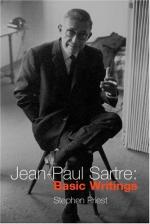|
This section contains 754 words (approx. 3 pages at 300 words per page) |

|
Born in this century of "specialized knowledge," when the human sciences have divided themselves into ever smaller sub-disciplines, Sartre's thought was complete: In the end, its subject was always the totality of human experience. Though perhaps primarily a moralist, Sartre also provided an epistemology and a psychology, a theory of emotions and a theory of history, even a full esthetics. And, like all "philosophies" in the classical sense, his was unified by an ontological vision…. Juding from Nausea, and from the pace of Being and Nothingness, the discovery of what was to form the bedrock underlying the multiple levels of Sartre's later work had the quality of an intuition, the force of an illumination. In trying to explain the prime energy and simplicity of his vision, one risks being branded a popularizer.
Allowed only one word to characterize it, I would choose "anti-idealism"—meaning not an absence of...
|
This section contains 754 words (approx. 3 pages at 300 words per page) |

|


